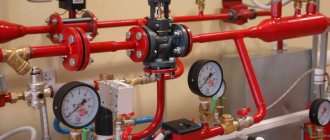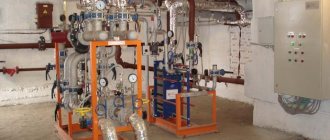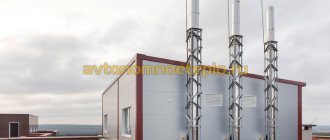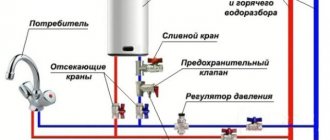Home / Housing / Housing and communal services
Back
Published: 01/27/2022
Reading time: 16 min
16
1436
Every year, as the heating season approaches, citizens have questions about the high cost of utilities and the quality of housing and communal services provided. Against the backdrop of rising fuel tariffs, individual heating in an apartment building is becoming more and more relevant. However, when studying information on how to do this, you may give up, because there are too many bureaucratic nuances and collection of documents.
FREE CONSULTATION WITH A LAWYER
Tel.
+7 (800) 302-65-54 Free in Russia
However, by seeking advice from a lawyer and planning your actions, you can disconnect from the central system.
5 alternatives to central heating.
- 1 Advantages and disadvantages of an autonomous heating system 1.1 The amount of payment for individual heating compared to central heating
- 2.1 SNiP on the use of an autonomous heat supply system
- 3.1 Gas boiler 3.1.1 Requirements for the premises in the apartment where a gas boiler can be installed
- 3.2.1 Using an electric boiler
- 4.1 Procedure for approving the transition to an autonomous heat supply system
How much does a gas boiler cost for a private home?
For residents of country life, the issue of heating arises. For those who have a gas main nearby, there are no difficulties. But, nevertheless, I want to choose a high-quality and efficient gas boiler at an affordable price. On the Internet you can find many reviews about different manufacturers of heating equipment. Let's look at the most popular gas boiler companies and their costs:
- An excellent solution for heating a private home is the installation of gas boilers from Baxi. Such boilers are distinguished by their reliability and high quality. Gas equipment is manufactured according to all standards. The manufacturer provides a long warranty period, so you don’t have to worry about problems with the equipment. The most inexpensive model is Baxi MAIN 5 14F, which costs 29,998 rubles. This boiler is suitable for heating small country and country houses. The maximum power is 14 kW. The most powerful and expensive equipment of this company includes the Baxi POWER HT 1.320, costing 750,052 rubles.
- Gas boilers from De-Dietrich are considered no less popular. The French company is one of the largest in the production of heating equipment. The cost of De-Dietrich gas boilers varies between 488,201-4,144,199 rubles.
- Rinnai gas boilers are reliable and safe. The cost of equipment starts at 33,900 rubles. The most expensive model costs 56,900 rubles.
- Protherm gas boilers are manufactured as single-circuit, double-circuit, atmospheric and turbocharged. The cost of the equipment is in the range of 31927-134296 rubles.
- Manufacturers of Electrolux gas boilers produce high-quality equipment at an affordable cost. The Electrolux Basic Space 24 Fi gas boiler costs 34,673 rubles, and the most expensive model is the Electrolux FSB 35 MPi/HW costing 149,432 rubles.
- Haier gas boilers cost from 22,542 to 34,138 rubles.
- Popular gas equipment are gas boilers from the Korean company Kiturami. You can purchase an inexpensive model for 25,000 or choose powerful equipment worth 615,000 rubles.
The range of services we offer
1. Insurance against the saying about the one who pays three times. 2. Setting clear goals and objectives for your contractor. 3. Audit of the submitted estimate documentation and specifications for materials. 4. Revision of the received working draft for the HVAC and HVAC sections (and how many errors are there...., and this, despite the cool names of the design bureaus) 5. Development of a preliminary installation diagram. 6. Development of estimate documentation. 7. Technical supervision or audit of completed installation and identification of shortcomings, inconsistencies and deviations from the project. (Here you can negotiate a percentage of savings) 8. Development of project documentation. 9. Installation of engineering systems (heating, water supply, ventilation, sewerage, electrical)
How much does a double-circuit gas boiler cost?
To heat and supply hot water in a small house, you can choose a gas double-circuit boiler from Protherm. The Jaguar model with a power of 24 kW will perfectly heat the entire area of the house. The cost of such equipment is 31,565 rubles. A similar option is the double-circuit wall-mounted boiler Baxi Main 5 14 F, which is distinguished by its reliability and durability. The cost of the heating boiler is 32,154 rubles.
For large rooms, a more powerful gas boiler De Dietrich Zena Plus MSL 28 MI FF worth RUB 63,061 is suitable.
The Japanese company Rinnai is popular. You can purchase a gas boiler from this manufacturer for 32,000 rubles.
heating of individual residential premises.
When calculating the payment for utility services for heating, it is impossible to subtract the area of apartments with individual (autonomous) heating from the total heated area on which the payment for the consumption of a utility resource is calculated, as this will lead to an unreasonable increase in the amount of payment for the owners of other premises. On the one hand, housing legislation does not exempt citizens who are disconnected from central heating from paying for the heat losses of the heating system of the apartment building and the consumption of thermal energy in the single-family heating system. On the other hand, it is not possible to determine the cost of payment only for the specified purposes if there are no individual metering devices in all residential and non-residential premises. Conclusion: the calculation is made in the general manner.
Thus, if the apartment building does not have a thermal energy utility, the payment for heating utilities is calculated on the basis of a standard approved by the state authority of a constituent entity of the Russian Federation in the manner established by the Government of the Russian Federation. In turn, since the current legal regulation does not provide for the possibility of switching one or more residential premises in an apartment building with central heating to another type of individual heating, the legislation does not establish the possibility of separately determining the consumption standard for heating in single-family houses and the consumption standard in residential ( non-residential) premises.
If individual heat energy meters are available in all residential and non-residential premises of an apartment building equipped with a thermal energy control unit, the fee will be determined taking into account the meter readings.
Thus, the owners of premises heated using individual apartment sources of thermal energy must be charged for the heating utility service. As AS SKO pointed out, re-equipping a premises by dismantling heating radiators without legal grounds cannot give rise to legal consequences in the form of releasing the owner of the premises who committed such actions from the obligation to pay for the consumed thermal energy. Apartments with individual heating are not deprived of heat supply through heat transfer through the general structures of the apartment building, equipped with a centralized heating system, through which not only residential premises are heated, but also the common property of the house (Resolution dated September 28, 2017 No. F08-7132/2017 in case No. A53-20472 /2016).
The stated approach is confirmed by other court decisions.
| Arbitration court | Judicial act |
| AS SKO | Resolution No. Ф08-9958/2017 dated 16.01.2018 on case No. A53-13387/2017, the transfer of which to the Judicial Collegium for Economic Disputes of the RF Armed Forces was refused by the Ruling of the RF Armed Forces dated 15.03.2018 No. 308-KG18-928 |
| Resolution dated February 26, 2018 No. F08-9705/2017 in case No. A53-13385/2017 | |
| AS SZO | Resolution dated November 2, 2017 No. F07-12165/2017 in case No. A42-6533/2016 |
| AS PO | Resolution dated July 6, 2017 No. F06-20460/2017 in case No. A57-13845/2016 |
| Resolution dated July 5, 2017 No. F06-21180/2017 in case No. A57-13843/2016 | |
| Resolution dated July 5, 2017 No. F06-20996/2017 in case No. A57-13844/2016 | |
| Resolution No. Ф06-24686/2017 dated 09/12/2017 on case No. A12-48753/2016, the transfer of which to the Judicial Collegium for Economic Disputes of the RF Armed Forces was refused by Ruling of the RF Armed Forces dated 01/22/2018 No. 306-ES17-20725 | |
| AS VSO | Resolution dated February 10, 2017 No. F02-7582/2016, F02-7746/2016 in case No. A10-958/2014 |
At the same time, it should be noted that in a number of cases, the judges of the Supreme Court of the Russian Federation supported the management company (HOA), heat supply organizations, which did not charge the owners of residential premises of apartment buildings equipped with an individual (autonomous) heating system a fee for the heating service. The rationale is this.
Payment should be charged only for thermal energy consumed and cannot be charged for energy not consumed, regardless of the reasons for which this energy was not received.
The housing inspection did not challenge the legality of converting apartments for individual heating; this issue was not the subject of inspection. There is no evidence that the heating devices in the disputed apartments are included in the list of devices prohibited for use for heating residential premises in apartment buildings, given in clause 44 of the Rules for connecting to heat supply systems.
| Judicial act |
| Resolution dated 02/09/2017 No. F01-6514/2016, F01-6515/2016 in case No. A79-8748/2015, the transfer of which to the Judicial Collegium for Economic Disputes of the RF Armed Forces was refused by the Ruling of the RF Armed Forces dated 05/26/2017 No. 301-KG17- 6395 |
| Resolution dated 02/05/2018 No. F01-6562/2017 in case No. A17-3138/2017 |
| Resolution dated February 28, 2018 No. F01-6319/2017 in case No. A11-1525/2017 |
| Resolution dated February 27, 2018 No. F01-6308/2017 in case No. A11-977/2017 |
How much does it cost to install a gas boiler?
Let's look at approximate prices for installing a gas boiler. Cost may vary depending on complexity of work and location.
- Installation of a wall-mounted gas boiler with a capacity from 0 to 36 kW/h costs 9,400 rubles.
- Installation of a wall-mounted condensing boiler with a capacity from 0 to 30 kW/h costs 12,700 rubles.
- Installation of a wall-mounted condensing boiler with a capacity of 31 to 60 kW/h will cost 15,300 rubles.
- Installation of a wall-mounted condensing boiler with a capacity from 61 to 100 kW/h costs 17,800 rubles.
- Installation of a wall-mounted condensing boiler with a capacity of more than 100 kW/h will cost 22,600 rubles.
- Installation of a floor-standing gas boiler with a capacity of 0-30 kW/h will cost 12,700 rubles.
- Installation of a floor-standing gas boiler with a capacity of 31-60 kW/h will cost 15,300 rubles.
- Installation of a floor-standing gas boiler with a capacity from 61 to 100 kW/h will cost 17,800 rubles.
- Installation and hydraulic piping of a floor-standing boiler will cost 19,700 rubles for boilers with a capacity of more than 100 kW/h.
How to install individual heating
To turn on the heating safely, it must be installed correctly. You can carry out the installation yourself, but it is better to do this at the final and simplest stage - when installing radiators and pipes.
The installation of complex components (boiler, risers, auxiliary equipment) should be entrusted to professionals.
The installed system must be checked for leaks. To do this, it is filled with coolant (water) and started. Detected leaks, which sometimes occur at joints, must be eliminated and the proper operation checked again.
How much does a wall-mounted gas boiler cost?
One of the budget options is the Baxi Fourtech 1.14 wall-mounted gas boiler costing 30,712 rubles. Such heating equipment is a good option in terms of price and quality. But the boiler is single-circuit. Inexpensive double-circuit boiler - Protherm Jaguar 24 JTV costing 31,309 rubles.
You can buy a gas wall-mounted boiler from the Japanese company Rinnai for 32,000 rubles. A gas boiler De Dietrich Zena MS 24 worth 34,422 rubles is considered a high-quality heating equipment.
For heating a large house, a condensing wall-mounted boiler Baxi Luna Duo - tec MP 1.110 worth RUB 240,221 is suitable. A similar unit is produced by De Dietrich, model Innovens Pro Mca 115, costing 292,723 rubles.
Heating scheme
Installation of individual heating of an apartment implies that all old pipes that were used for central heating will be dismantled. This means that a person will have to face additional costs for cosmetic repairs.
As a rule, in practice a two-pipe system is used, which is more efficient and convenient. Pipes of this category are small in volume, so they look aesthetically pleasing in the apartment. An important advantage is the installation of separate heating systems, which allows you to temporarily dismantle parts of the pipes for repair or replacement, without harm to the overall heating system.
How much does a floor-standing gas boiler cost?
One of the inexpensive Korean gas floor-standing boilers is equipment from Kiturami with a power of 15.10 kW. The cost of such a unit is 36,300 rubles. It is worth highlighting a gas floor-standing boiler with a capacity of 27.10 kW from Protherm, model Bison, costing 48,000 rubles. The equipment is characterized by durability and reliability, as well as reasonable cost.
For heating large industrial premises, a gas floor-standing boiler from Proterm, model Bizon, with a power of 3500 kW, is suitable. Such equipment can heat up to 35,000 sq.m. The cost of a gas boiler is 2,051,000 rubles.
What devices will be required?
Gas companies are actively inviting owners of houses and apartments to switch to separate heating, but no one warns what difficulties applicants for individual heating will have to face. So, the user will have to spend money on the following equipment:
- boiler (upon granting permission, the person will be offered the parameters of a heating device that can be installed in a specific apartment, taking into account the technical features of the housing);
- meters and other elements for calculating gas consumption for heating housing;
- a separate system for capturing air from outside, which protects the air space inside the room;
- pipes necessary for the removal of combustion objects.
How much does it cost to heat a house with a gas boiler?
The most optimal is gas heating for the home. You won't have to pay huge bills every month. On average, you will have to pay about 2,500 rubles per month. But this price is approximate, since everything depends on the area of the room, insulation of the house and temperature conditions.
But before you find out how much gas heating will cost per month, you need to think about the cost of installing a gas boiler. To do this, you need to supply gas to the house, as well as install pipes. After this, you need to install a gas boiler. Such actions require a lot of funds. But if you still decide to heat your house with gas, you will have to spend a decent amount.
First of all, you will need to prepare all the documents that require not only time, but also an investment of funds. In addition, you must go through all stages of fire safety testing. Afterwards, it is necessary to obtain a gasification project for a private house and coordinate planning issues. To do this you will have to spend about 350,000 rubles. Installation of a gas system will cost approximately 85 thousand rubles. Installation of a gas boiler costs an average of 50 thousand rubles.
If you do not have gas supplied to your house, and you need to do everything from scratch, then this method of heating your house will cost a decent amount. But despite this, the monthly heating bill will be small compared to other heating systems. As an alternative to main gas heating, you can use gas cylinders. Liquefied gas from a cylinder is suitable for almost every gas boiler. This method will be much cheaper, but the disadvantages are a low level of safety of use and a low level of environmental friendliness.
Preparation and approval of documentation for the transition to an individual heating system
Switching heating to apartment heating in an apartment building means completely abandoning the central system. This procedure leads to the re-equipment of all utilities and instruments with the subsequent entry of information into the object’s passport.
According to Art. No. 25 Residential Complex of Russia, such events are referred to as “reconstruction of an apartment or house.”
The procedure is covered in Chap. No. 4, in urban planning regulations on the reconstruction of the intra-house heating system and contains:
- creating a project;
- getting permission;
- drawing up a commissioning report;
- other.
Replacing heating devices used to heat an apartment in an apartment building means that it is necessary to coordinate all actions. This procedure falls under Article No. 25 of the Housing Code of the Russian Federation and clause No. 1.7.1 “Rules and Standards for the Operation of Housing and Communal Funds” (PP No. 170).
Contour diagram of the IO.
In Art. No. 26 of the Housing Code of the Russian Federation states that refurbishment of housing is necessary only after agreement with the authorized department of local significance. Moreover, you need to comply with the requirements and regulations, and also wait for the decision to be published.
Procedure for approving the transition to an autonomous heat supply system
Re-equipping the room must be carried out in agreement with the department responsible for the territory on which the high-rise building is located. To do this, the owner must submit an application. The document template was approved in PP No. 266 dated April 28, 05.
In addition to the application, the citizen needs to collect papers, the list of which is covered in Art. No. 26 Residential complex of Russia. The provisions of the code also provide a list of technical documents. The project is properly prepared for the correct installation of individual heating. The heat supply source can be gas or powered.
The project is ordered from special companies. A citizen should request certificates confirming the right of admission to such events. The certificate is issued by the construction municipality.
When installing heating units in an apartment, it is necessary to ensure compliance with the technical parameters.
The equipment must have:
- sanitary and epidemiological conclusion confirmed by a certificate;
- permission from Rostekhnadzor;
- certificate of conformity.
Due to the fact that the heating system in an apartment building is common property, its area must be reduced with the consent of all owners. A similar situation is associated with the ongoing re-equipment of heat supply in at least one room. The norm is enshrined in Article No. 36 of Part No. 3 of the Housing Code of Russia.
Thus, wishing to refuse heating in an apartment building, the applicant must obtain permission not only from the municipality, but also enlist the support of the owners of the apartment buildings.
For your information: in the absence of the necessary documentation, a citizen’s actions to switch to individual heat supply are regarded as an unauthorized disconnection from the central resource.
Nuances of unauthorized connection to an autonomous heat supply system
If a person intends to arbitrarily disconnect from the central system, then the actions are regarded as unauthorized misadjustment of the utility networks of the house. It doesn’t matter if it’s a panel MKD or a brick one – in any case, the measures entail incorrect distribution of resources, overheating of communications or underheating of individual premises. As a result, people's civil rights to receive heat will be infringed. Accordingly, the resource provider can sue the owner.
Note: an illegal transition to individual heating in an apartment inexorably leads to disruption of the entire system and increased fuel consumption. This is due to the fact that during construction the project included a certain diameter of pipes on the main line.
When some of the consumers living in the apartment building lose power, the power reserve in the boiler room increases. Such actions negatively affect the work of the supplier company and also negatively affect the quality of the services provided. For example, the tariff for heat increases, which entails a violation of the rights of other citizens.
Examples of the use of air source heat pumps for heating apartments.
Where to apply for permission to switch to an individual heating system
In order to legally turn off the heating in an apartment and connect an individual heating supply, you must submit documentation to the administration of the locality. Additionally, you can submit papers through the MFC.
As a rule, these departments send a refusal to register and register the re-equipment. Officials are motivated by the fact that the project does not comply with current norms and standards or that the papers lack some information.
However, it is necessary to understand that the actual grounds for refusal are:
- Officials of the authorities do not want to accept responsibility for issuing permission to reconstruct the premises, since shortcomings and errors in calculations can lead to emergency recognition of the house.
- This process is unprofitable for housing and communal services and supplying enterprises, since it leads to a reduction in the amounts in receipts.
In case of disputes, citizens should contact the judicial authorities.
A sample application for redevelopment is available for download here.
Necessary documents for conversion to an autonomous heating system
To agree on the installation of autonomous heating in a room, it is necessary to collect papers approved by Article No. 26 of the Housing Code of Russia:
- Application. The text of the document must contain the address of the apartment where the refurbishment is planned. Approval is carried out by all owners. Additionally, the approximate scope of work and other technical indicators are indicated.
- Certificate confirming the right to own an apartment - purchase agreement, lease, certificate of ownership.
- Residential refurbishment project.
- Technical passport.
- Written consent of all citizens living at the site to install an individual heating system.
- Conclusion from the department for the protection of architectural heritage and permission to carry out redevelopment. This document is required if a private or apartment building is recognized as a cultural monument.
Nuances of preparing a project for an autonomous heat supply system
The main problem when installing gas or electric heating equipment is that the apartment building already has a general heating system. The owners of the highway are the owners of the premises.
Installation of autonomous heating entails updating information that:
- the system belongs to a number of persons;
- is an element of a large engineering network owned by the supplier company and housing and communal services.
Removing even a small part, as well as making adjustments to documents, entails the following work:
- create a project;
- correctly select communication elements and equipment;
- install the system so that the rights of other citizens are not affected and do not increase the risk of an accident.
Therefore, the first stage is to coordinate upcoming events with the owners of apartment buildings, and not just with the municipality.
Possible obstacles when transferring to an individual heating system and overcoming them
Installation of autonomous heating in an apartment building has a number of nuances. Thus, during installation, citizens are faced with the problem of formalizing and legitimizing the procedure. The disadvantage of individual heating is that it is necessary to select heating elements, since the main mistakes relate specifically to equipment.
When the owner lives in an apartment building connected to central heating, it is difficult to obtain official permission to install an autonomous system. Or you may need to invest a large amount. At the same time, expenses concern not only funds, but also time.
The difficult part is the technical documentation. When planning the installation of an individual heating system, the legislator imposes requirements on the applicant to collect papers. At this stage, one is often faced with banal bureaucracy. In 2022, it will be quite difficult to abandon central heating. In this case, the decision remains with the municipality, but government officials, as a rule, refuse to carry out redevelopment.
The reasons and motivation of the official are understandable, since there is always the possibility of making mistakes that will lead to a decrease in the heat level in neighboring rooms. In addition, incorrect calculations can lead to disruption of the central heating system as a whole. Accordingly, an imbalance will arise in the high-rise building system.
However, there is another side to the coin, which also relies on existing laws. So, if a citizen has no debt to the supplier company, then he has the right to install an autonomous heating system. As a result, the contract with the state company will be terminated. To achieve your goal, you need to be persistent and contact lawyers.
How much does a gas boiler cost for an apartment?
You can install a gas boiler in an apartment only on the wall. There are no other accommodation options. For example, for a floor-standing gas boiler it is necessary to arrange a separate room with a solid foundation.
When choosing heating equipment, you should pay attention to the power of the unit. A gas boiler cannot operate constantly at full power, as the device will soon fail. This is why you should add about 10% to the required power. Even with high-quality insulation, heat loss should be taken into account. The location of the apartment in the house (corner or not), as well as the material of the walls, influence how the boiler will heat the apartment.
In total, it is necessary to increase the required power by 30-35%.
A gas boiler can have an open or closed combustion chamber. But which option to choose for an apartment? Let's take a closer look at each type:
- A gas boiler with an open combustion chamber is connected to a common house smoke exhaust duct. But the main disadvantage of this type is the drying of the air. Therefore, it is necessary to ventilate the apartment frequently.
- In a gas boiler with a closed combustion chamber, air is taken from outside. Therefore, you need to install a coaxial chimney. This is not possible in all homes.
In addition, it is worth paying attention to the number of circuits in the heating boiler. If the house has a instantaneous water heater, then there is no need to purchase a double-circuit boiler. If not, then it will simply be necessary.
The most popular brands of gas boilers that are chosen for apartments are Protherm, Baxi and Bosch.
Most often on the Internet you can find reviews about gas boilers from Proterm. They are distinguished by durability and quality of work. Therefore, such gas equipment is perfect for heating an apartment. For example, a gas double-circuit boiler Proterm Cheetah costs 33,300 rubles. The efficiency is 93.2%, and the power of 23.3 kW is enough to heat the apartment.
Is the customer always right?
If you look at the statistics of Yandex & Google queries, the question about the cost of installing heating in your home interests users every 32 seconds, without breaks for lunch and sleep (data for Russia).
Then, having seen hundreds of advertisements in front of them, some with a set turnkey price, users choose two or three companies they like, invite specialists, and then study the commercial proposals received. Everyone makes the decision to work with a particular contractor based on their personal experience, knowledge and opinion. We ourselves are engaged in the installation of utility networks (such as intra-house and intra-apartment heating; we are engaged in the organization of uninterrupted water supply; and, most importantly, what no household can do without - water drainage or sewerage), as well as their repair and maintenance. Therefore, we constantly have to participate in such tenders; competition is high, but solvency is the opposite. Sometimes, it is possible to convince the customer that saving a few rubles will bring serious problems with the performance of the heating circuits in the future, and sometimes it is necessary to abandon the object. We try not to follow the path: “The customer is always right.” As a rule, with such customers, after six months or a year, the following saying comes into effect:
“A miser pays twice, a fool pays three times....” Popular proverb. (Release date unknown..)
You know that everyone has their own goal, some to save money, others to make money, and in order not to miss an order,
Many specialists resort to tricks, skimping on the quality of materials and equipment or making the system beyond repair. There are dozens of such cases when, in order to replace a failed element, it is necessary to dismantle part of the pipelines, and sometimes open up floors and walls.
But the solution lies on the surface, and we will tell you how best to do it once and normally, rather than trying to force the contractor to fit into your budget, thereby forcing him to sacrifice quality.
How much does it cost to service a gas boiler?
Any gas boiler is a technically complex device that must be constantly monitored. This is why you need to periodically service your gas boiler. Let's look at approximate prices for services:
- Departure within a small concrete ring – 2500 rubles;
- Tariff for visiting a site outside the small concrete ring, per km. in both directions - 30 rubles;
One-time gas boiler maintenance:
- Wall-mounted single-circuit - 4000 rubles;
- Wall-mounted double-circuit - 4000-4500 rubles;
- Wall-mounted condensing (up to 49 kW) from 6,000 rubles;
- Wall-mounted condensing (over 50 kW) from 7,000 rubles;
- Floor-standing with atmospheric burner (up to 59 kW) - 4,000 rubles;
- Floor-standing with atmospheric burner (60-99 kW) - 5,000 rubles;
- Floor-standing with atmospheric burner (100-150 kW) - 6,000 rubles;
- Floor-standing with a forced-air burner (up to 29 kW) - 6,000 rubles;
- Floor-standing with a forced-air burner (30-59 kW) - 6,000 rubles;
- Floor-standing with a forced-air burner (60-119 kW) - 7,000 rubles;
- Floor-standing with forced-air burner (120-249 kW) – negotiable;
- Floor-standing with a forced-air burner (over 250 kW) – negotiable.
* * *
An apartment building is a complex, multifunctional and single object. The use of all its technical, engineering and other communications, as well as infrastructure, serves a single purpose - the maintenance and maintenance of the entire facility (that is, the house), including heating of housing construction according to established rules, quality standards (for example, maintaining a certain temperature regime). In this regard, housing legislation does not exempt citizens who have been disconnected from central heating from paying for the heat losses of the heating system of the apartment building and the consumption of thermal energy on the central heating system.
Housing and communal services: accounting and taxation, No. 4, 2022











